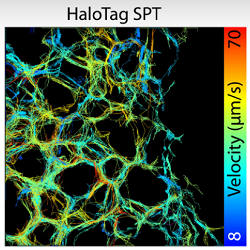
New CIMR research led by Dr Joseph Chambers, PhD student Nikita Zubkov and Prof. Stefan Marciniak has revealed a new mechanism for certain types of rare genetic disease. Their new publication in Science Advances focuses on alpha-1 antitrypsin, or AAT; a protein made in the liver that normally protects the lungs from damage. Around 12,000 people in the UK suffer from alpha-1 antitrypsin deficiency, an inherited disorder in which abnormal forms of AAT accumulate in liver cells.
In addition to causing lung disease, AAT deficiency can also damage the liver, particularly when the liver is stressed by alcohol or obesity. To model and probe the mechanisms of this process, Dr Chambers, Mr Zubkov and their colleagues used cells expressing the disease-causing Z-form of AAT. Their research showed that the Z-form of AAT forms polymers inside the ER which undergo a liquid:solid phase transition to form a molecular ‘sieve’, trapping other, larger ER proteins. The research provides a new explanation for how liver cells are damaged in alpha-1 antitrypsin deficiency, and suggests how new therapies might protect the liver. This newly-discovered mechanism of molecular sieving may also be a common feature of other diseases where such ER aggregates occur, and could lead to new treatments beyond AAT deficiency.

